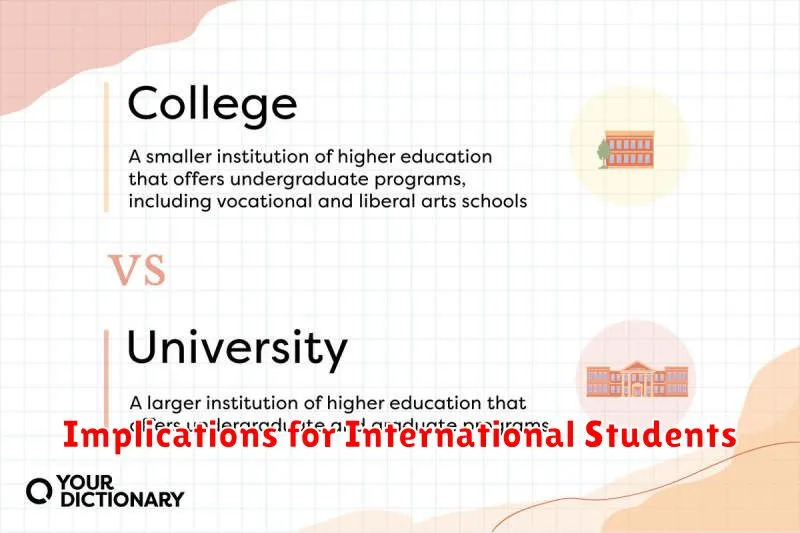Choosing the right path for higher education can be a pivotal point in one’s academic and professional journey, often leading to the question: What is the difference between college and university? Understanding these differences is crucial as it shapes the educational experience and future opportunities. While the terms are sometimes used interchangeably in casual conversation, they signify distinct institutions and educational approaches. In this article, we will dive into the key aspects that differentiate colleges from universities, providing clarity for prospective students ready to make an informed decision on their higher education trajectory. Whether you are drawn to the intimate environment of a college or the expansive opportunities of a university setting, this guide will help you navigate your options wisely.
Understanding Terminology in Different Countries
When discussing the educational structures of different countries, it’s crucial to understand that the terms “college” and “university” can have varying meanings depending on the nation’s context. In the United States, a college generally refers to smaller institutions that primarily offer undergraduate degrees, while a university typically denotes a larger institution that provides both undergraduate and graduate degree programs.
In contrast, in countries like Canada and the United Kingdom, the term college may refer to different types of institutions. For instance, colleges in Canada often offer vocational training or serve as a place to complete the first two years of a bachelor’s degree. In the UK, college could refer to institutions providing pre-university level education or parts of a university system.
The distinction is further complicated in countries such as Australia, where college can be synonymous with high school-level education or part of the entirety of a university’s structure. Hence, the terms carry distinct nuances reflective of each country’s unique educational framework, emphasizing the need for clarity when discussing higher education internationally.
College vs University in the U.S. Context
In the United States, the terms “college” and “university” are often used interchangeably, but they have distinct meanings. Understanding the difference is crucial for prospective students, educators, and anyone interested in higher education.
A college typically refers to an institution that offers undergraduate degrees. These institutions focus on providing a strong foundational education and often emphasize a liberal arts curriculum. Many colleges are smaller than universities, fostering a close-knit community atmosphere with more personalized attention from faculty.
On the other hand, a university encompasses both undergraduate and graduate programs. Universities are generally larger and consist of multiple colleges or schools within their framework. They are generally research-oriented and offer a wide range of advanced degrees, such as master’s and doctoral programs.
The distinction is not just in size or the types of degrees offered but also in the scope of academic and extracurricular opportunities. Universities often have more resources, facilities, and funding for research projects, while colleges may provide a more focused and intimate educational experience.
How the Terms Are Used in UK, Canada, and Australia
In the United Kingdom, the terms “college” and “university” have distinct meanings. Universities are institutions that offer undergraduate and postgraduate degrees. They are well-regarded centers for higher learning, research, and academic prestige. On the other hand, colleges in the UK are often associated with secondary education or further education, providing courses for students over 16, such as A-levels or vocational training. Some colleges may also be part of a university, serving as sections or faculties within the larger institution.
In Canada, the distinction is somewhat different. Canadian universities are similar to those in the UK and the US, as they provide bachelor’s, master’s, and doctoral programs. Canadian colleges, however, tend to focus on diploma and certificate programs in applied fields and trades. They emphasize practical and vocational training designed to prepare students for specific careers. Some colleges in Canada, known as “university colleges,” offer both degree programs and applied courses, bridging the gap between the two educational formats.
In Australia, the term “university” refers to institutions that grant higher education degrees, much like in other parts of the world. Australian colleges are predominantly used to describe secondary education institutions, known as boarding or private schools, rather than higher education facilities. However, some technical and further education (TAFE) institutions are called colleges, where vocational training and certificate courses are offered. This highlights a commonality in offering practical and vocational education, similar to the Canadian system.
Size and Scope of Programs Offered
When examining the size and scope of programs offered, the differences between a college and a university become apparent. Generally, universities are larger institutions that provide a broad range of undergraduate, graduate, and often doctoral programs. They cater to a diverse student body with various academic interests and professional aspirations. This extensive offering is supported by a wide array of departments and research facilities.
In contrast, colleges often focus on undergraduate education and may offer fewer programs than universities. They are generally smaller in size and provide a more personalized learning experience. Some colleges may offer limited graduate programs, but their primary emphasis lies in bachelor’s degrees and specialized fields of study.
The structural differences in size and scope ultimately influence the academic culture and resources available to students, with universities typically providing more extensive resources and research opportunities.
Degree Levels: Associate vs Bachelor vs Master
Understanding the different degree levels offered by colleges and universities is crucial for prospective students. Each degree level serves a distinct purpose and has unique requirements and outcomes.
An Associate degree is typically a two-year program that provides foundational knowledge and skills. It is often offered by community colleges and can serve as a stepping stone to a Bachelor’s degree or as a qualification for entry-level positions.
The Bachelor’s degree is a more comprehensive four-year program that delves deeper into a student’s chosen field of study. It is commonly offered by both colleges and universities and serves as the standard qualification for most professional careers.
A Master’s degree is an advanced, graduate-level program that usually requires an additional two years of study beyond the Bachelor’s degree. This degree is designed for those seeking to gain specialized knowledge and skills in a specific area, often necessary for leadership roles or further academic research.
Each degree level opens different professional and academic opportunities, making it important for students to consider their career goals and timeline when choosing their educational path.
Implications for International Students

When considering studying abroad, understanding the distinction between a college and a university is crucial for international students. These terms are often used interchangeably, yet they bear distinct meanings in different countries, impacting educational choices significantly.
In the United States, a university typically refers to an institution comprising various colleges encompassing a wide range of specializations and offering both undergraduate and graduate programs. Contrarily, a college might solely focus on undergraduate studies, offering a more intimate learning environment and potentially lower tuition costs.
This distinction is important for international students deciding on their academic path, as each setting might offer different levels of academic opportunities, social interactions, and cultural exposure. Universities might provide a broader array of resources and research opportunities, while colleges could offer a more personalized educational experience with close-knit communities.
Therefore, international students must consider their academic goals, preferred learning environment, and budgetary constraints when choosing between a college and a university. Understanding these differences aids in making an informed decision, aligning with one’s aspirations and ensuring a rewarding educational journey.
Which One Should You Apply To?
Choosing between a college and a university can be daunting, as both offer unique experiences and opportunities. A college typically provides a more intimate environment with smaller class sizes, focusing heavily on undergraduate education, which can be beneficial for students who prefer personalized attention and a closer engagement with faculty.
On the other hand, a university often provides a wider range of academic options, including graduate programs. Universities tend to have larger campuses and offer more research opportunities, making them ideal for students looking to pursue advanced degrees or engage in innovative projects.
Ultimately, the decision should align with your personal and academic goals. Consider what atmosphere will allow you to thrive—whether it’s the close-knit community of a college or the extensive resources available at a university. Reflect on what kind of educational experience will best support your aspirations and career objectives.
FAQs About College vs University Differences
In the US, a major difference between colleges and universities is the scope and level of the degrees they offer. Generally, colleges focus on providing undergraduate programs and are often smaller in size, offering a more personalized educational experience. In contrast, universities offer both undergraduate and advanced degrees (such as master’s and doctoral programs) and tend to have a larger, more diverse student body.
A common question is whether the term ‘college’ or ‘university’ affects the quality of education. The key factor is not the name but accreditation and the institution’s reputation, which ensure a certain standard of quality. Many well-respected institutions in the US are named colleges but have academic credentials comparable to those of universities.
Another frequently asked question involves the differences in campus life. Colleges often provide a tight-knit community with more opportunities for close interaction with professors and peers. Universities usually offer more extensive resources, including research facilities and a wider variety of extracurricular activities, due to their larger size.
Internationally, the distinction might differ. For example, in some countries, the term ‘college’ may refer to secondary education institutions, which can be confusing for international students eyeing studies in the US. Understanding these differences is crucial for making an informed decision about where to pursue higher education.

